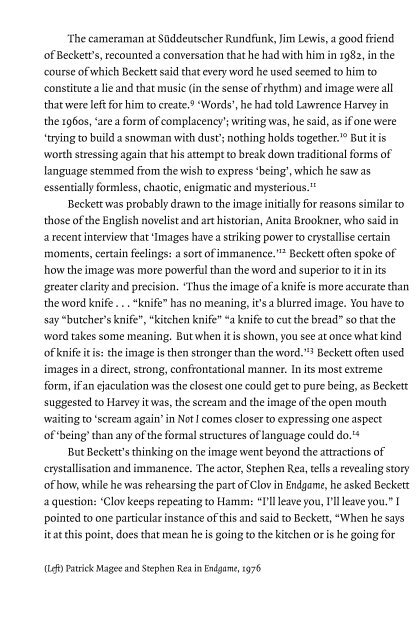You also want an ePaper? Increase the reach of your titles
YUMPU automatically turns print PDFs into web optimized ePapers that Google loves.
The cameraman at Süddeutscher Rundfunk, Jim Lewis, a good friend<br />
<strong>of</strong> <strong>Beckett</strong>’s, recounted a conversation that he had with him in 1982, in the<br />
course <strong>of</strong> which <strong>Beckett</strong> said that every word he used seemed to him to<br />
constitute a lie and that music (in the sense <strong>of</strong> rhythm) and image were all<br />
that were left for him to create. 9 ‘Words’, he had told Lawrence Harvey in<br />
the 1960s, ‘are a form <strong>of</strong> complacency’; writing was, he said, as if one were<br />
‘trying to build a snowman with dust’; nothing holds together. 10 But it is<br />
worth stressing again that his attempt to break down traditional forms <strong>of</strong><br />
language stemmed from the wish to express ‘being’, which he saw as<br />
essentially formless, chaotic, enigmatic and mysterious. 11<br />
<strong>Beckett</strong> was probably drawn to the image initially for reasons similar to<br />
those <strong>of</strong> the English novelist and art historian, Anita Brookner, who said in<br />
a recent interview that ‘<strong>Images</strong> have a striking power to crystallise certain<br />
moments, certain feelings: a sort <strong>of</strong> immanence.’ 12 <strong>Beckett</strong> <strong>of</strong>ten spoke <strong>of</strong><br />
how the image was more powerful than the word and superior to it in its<br />
greater clarity and precision. ‘Thus the image <strong>of</strong> a knife is more accurate than<br />
the word knife...“knife” has no meaning, it’s a blurred image. You have to<br />
say “butcher’s knife”, “kitchen knife” “a knife to cut the bread” so that the<br />
word takes some meaning. But when it is shown, you see at once what kind<br />
<strong>of</strong> knife it is: the image is then stronger than the word.’ 13 <strong>Beckett</strong> <strong>of</strong>ten used<br />
images in a direct, strong, confrontational manner. In its most extreme<br />
form, if an ejaculation was the closest one could get to pure being, as <strong>Beckett</strong><br />
suggested to Harvey it was, the scream and the image <strong>of</strong> the open mouth<br />
waiting to ‘scream again’ in Not I comes closer to expressing one aspect<br />
<strong>of</strong> ‘being’ than any <strong>of</strong> the formal structures <strong>of</strong> language could do. 14<br />
But <strong>Beckett</strong>’s thinking on the image went beyond the attractions <strong>of</strong><br />
crystallisation and immanence. The actor, Stephen Rea, tells a revealing story<br />
<strong>of</strong> how, while he was rehearsing the part <strong>of</strong> Clov in Endgame, he asked <strong>Beckett</strong><br />
a question: ‘Clov keeps repeating to Hamm: “I’ll leave you, I’ll leave you.” I<br />
pointed to one particular instance <strong>of</strong> this and said to <strong>Beckett</strong>, “When he says<br />
it at this point, does that mean he is going to the kitchen or is he going for<br />
(Left) Patrick Magee and Stephen Rea in Endgame, 1976<br />
IMAGES OF BECKETT 49


